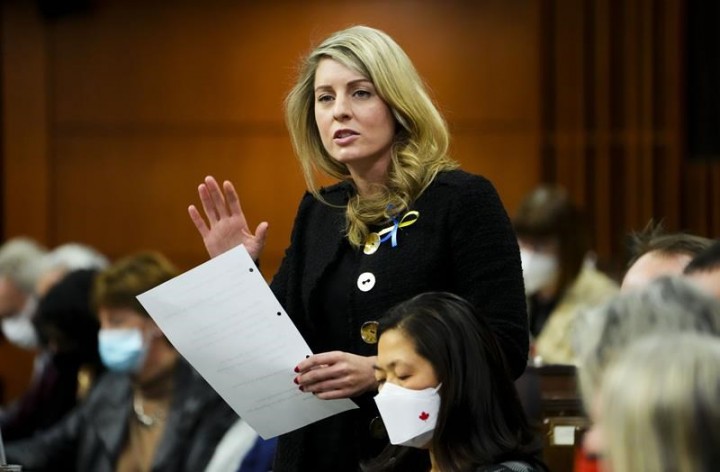OTTAWA — Canada and China disagree on many things but Beijing’s buy-in is essential on one key issue — helping end the Russian war on Ukraine, says Foreign Affairs Minister Mélanie Joly.
Joly told The Canadian Press that is a message she delivered in her phone call last week with Chinese Foreign Minister Wang Yi before arriving this week in Southeast Asia for a two-country trip that has one overarching purpose: helping deliver the Liberal government’s long-promised Indo-Pacific strategy.
The Indo-Pacific label is foreign policy shorthand for policies and approaches to the vast Asia-Pacific region that are meant to exclude China in an attempt to deal with its massive influence in the region.
Joly’s visit to Indonesia and Vietnam also comes as the Western countries, especially the United States, are leaning on China to be less supportive of the Russian invasion of Ukraine.
“We don’t agree on many things. But at the same time, we need to engage. I would say also that it is important for China to know what Canada’s position is on Ukraine,” Joly said in an interview from Indonesia this week, prior to her departure for Vietnam.
“I think we’re extremely specific and vocal about it. But at the same time, we think that China has an opportunity to make sure that it plays a constructive role to end the war.”
It was the first time the foreign ministers of Canada and China spoke since the September 2021 release of two Canadian men, Michael Kovrig and Michael Spavor, from nearly three years in Chinese prisons, an incident that plunged Sino-Canadian relations to an all-time low.
The two men were imprisoned in apparent retaliation for Canada arresting Chinese tech executive Meng Wanzhou on an American extradition warrant in 2018.
The matter was only resolved when the U.S. Justice Department withdrew its extradition request, which paved the way for what was essentially a prisoner swap.
A readout of the call from the Chinese embassy, which said Joly initiated the call, showed that China still has hard feelings about Canada’s role in the arrest and attempted extradition of the Huawei executive, while it indicated little movement on the Ukraine question.
“The essence of this case is that the United States suppressed Chinese high-tech enterprises by coercion. Such despicable behaviour is seen clearly by the world,” said the Chinese statement.
“Wang Yi said, no country should embolden this unilateral bullying by ‘playing the jackal to the tiger,’ a Chinese proverb indicating ‘help a villain do evil.’”
On Ukraine, Wang told Joly that China wants the world to “think calmly and rationally” and work toward a ceasefire and peace. “Upholding an objective and impartial position, China will continue to play a constructive role in this regard,” said the statement from the Chinese embassy.
The U.S. wants to see Canada follow through on a tougher policy toward China, and Prime Minister Justin Trudeau has tasked Joly with coming up with a way forward in her mandate letter. Though China is not mentioned by name, the letter tells Joly to develop a comprehensive Indo-Pacific strategy to deepen diplomatic, economic, military and international assistance partnerships in the region.
In recent months, Canada has already taken steps to diversify its trade options in Asia and the Indo-Pacific by opening talks with India, the ASEAN block of nations — which includes Indonesia and Vietnam — and Taiwan, which China regards as a breakaway province.
Canada conspicuously announced the start of trade talks with Taiwan after Kovrig and Spavor were released, which has rankled Beijing.
“The one-China principle is the political foundation of China-Canada relations. If the Taiwan question is not handled properly, China-Canada relations will suffer fundamental damage,” said the Chinese embassy statement.
“China hopes that Canada will adopt a correct attitude and position on issues concerning China’s core interests.”
Joly said her discussion with Wang was “respectful” and “frank,” but she made clear she discussed Taiwan and the human rights situation with ethnic Muslim Uyghurs in China’s Xinjiang province. China faces allegations of mass arbitrary detention, repressive surveillance measures, forced labour and sterilization of the Uyghurs. China denies the charges.
China was one of the 35 countries that abstained in the March vote at the United Nations General Assembly condemning Russia for its aggression against Ukraine. Canada and its Western allies were among the 141 countries that voted in favour of the resolution.
Indonesia voted in favour, despite China’s large regional influence, but Vietnam abstained.
Joly said part of her mission in the region this week was to reinforce the need to condemn the Russian aggression. She saw one very direct impact of the war on the everyday life of Indonesians — the price of cooking oil, a staple in food preparation, had risen substantially.
“It is essential to their way of living. It’s linked to the war in Russia,” Joly said.
“At the same time, let’s be very cognizant of the fact that Russia has launched many propaganda campaigns across social media, and we need to be clear and repeat our narrative.
“We need to engage with Indonesia for them to hear our position, but also to continue to be a strong ally.”
This report by The Canadian Press was first published April 12, 2022.
Mike Blanchfield, The Canadian Press
Related


































